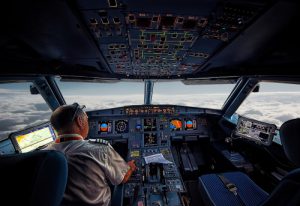
Secondary cockpit barriers would be required in all new passenger airplanes to deter hijackers under a measure led by U.S. Rep. Brian Fitzpatrick (R-PA) that was included in the Federal Aviation Administration (FAA) reauthorization bill approved by the U.S. House of Representatives on April 27.
“As our nation continues to combat the threat of terrorism, it is crucial that we learn from the past in our mission to keep our nation safe,” said Rep. Fitzpatrick, a member of the U.S. House Homeland Security Subcommittee on Transportation and Protective Security. “Protecting the cockpits in our nation’s airplanes is critical in preventing commercial airliners from being turned into weapons of war.”
The FAA Reauthorization Act of 2018, H.R. 4, introduced on April 13 by U.S. Rep. Bill Shuster (R-PA), chairman of the U.S. House Transportation and Infrastructure Committee, would extend FAA programs and funding for five years. The House-approved H.R. 4, which overwhelmingly passed in a 393-to-13 vote, includes language from Rep. Fitzpatrick’s Saracini Aviation Safety Act of 2017, H.R. 911.
In approving H.R. 4, the House has taken “a key step forward by requiring the installation of secondary cockpit barriers on all new passenger aircraft,” Rep Fitzpatrick said. “While this is a major victory for airline safety, we will continue to fight until all current passenger aircraft contain secondary barriers.”
Named in recognition of airline pilot Captain Victor Saracini, who lost his life during the hijacking of United Flight 175 on 9/11, H.R. 911 would require that “light weight wire mesh gates” be installed between the cockpits and passenger cabins of aircrafts, according to a summary provided by Rep. Fitzpatrick’s office. The wire mesh gates would be used to block access to the cockpit when the primary door is opened during meals, bathroom breaks, or for other reasons.
Ellen Saracini, the widow of Victor Saracini, said the skies remain susceptible to repeat acts of terrorism more than 15 years after a terrorist breached the cockpit of her husband’s plane on Sept. 11, 2001.
“It is my mission to work with Congressman Brian Fitzpatrick to ensure we are doing everything we can to protect the flight deck aboard our nation’s airliners because, without secondary barriers, we are just as vulnerable today as we were on that fateful day,” said Ellen Saracini, who attended the House vote on H.R. 4.
The bill has been endorsed by 9/11 Commission Chair Tom Kean, former U.S. Secretary of Homeland Security Tom Ridge, a host of aviation groups, the Port Authority of New York and New Jersey, and the Federal Law Enforcement Officers Association, among others, according to the congressman’s staff.



